新概念英语第二册情态动词课件(共41张PPT)
文档属性
| 名称 | 新概念英语第二册情态动词课件(共41张PPT) |  | |
| 格式 | pptx | ||
| 文件大小 | 899.2KB | ||
| 资源类型 | 教案 | ||
| 版本资源 | 新概念英语 | ||
| 科目 | 英语 | ||
| 更新时间 | 2024-11-25 09:28:04 | ||
图片预览

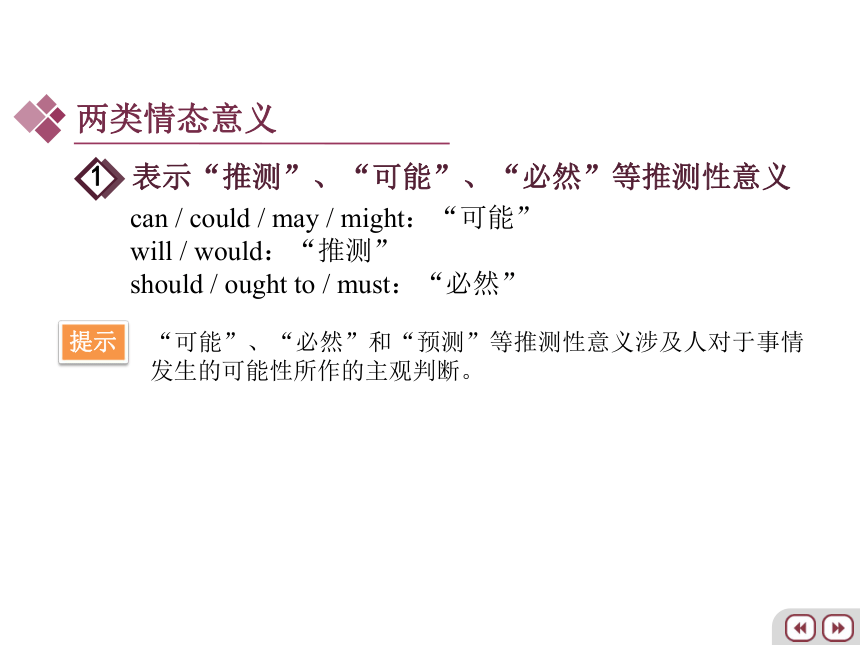
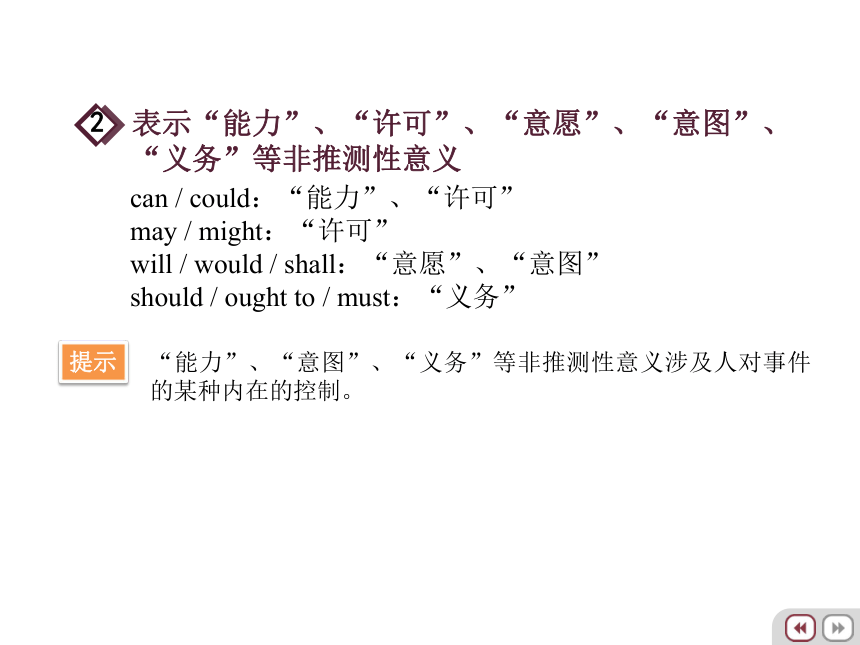
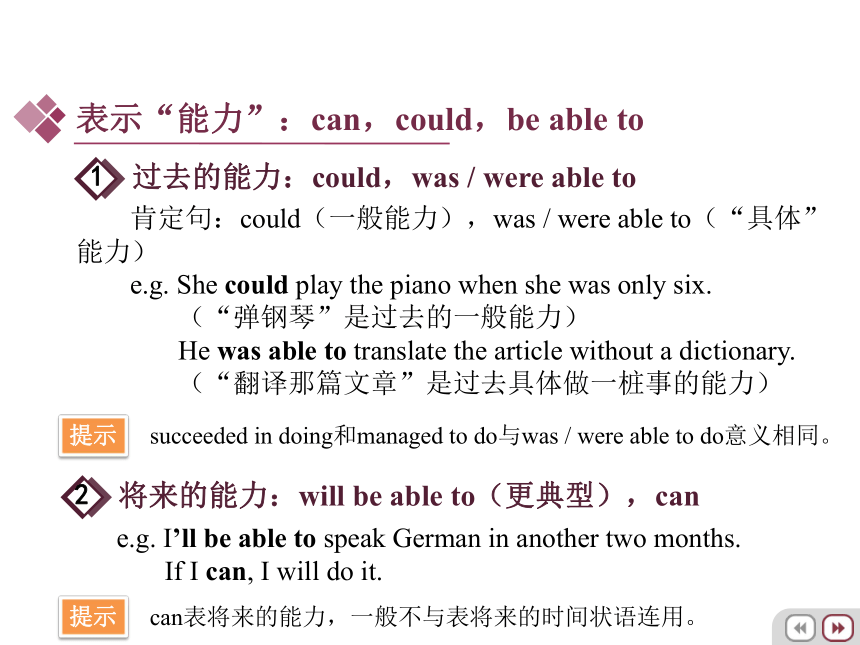

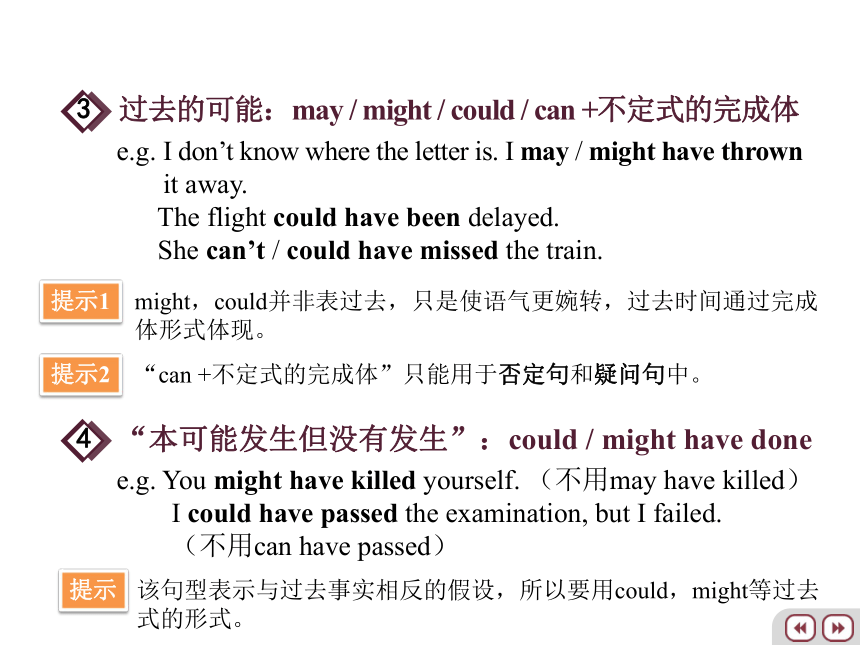
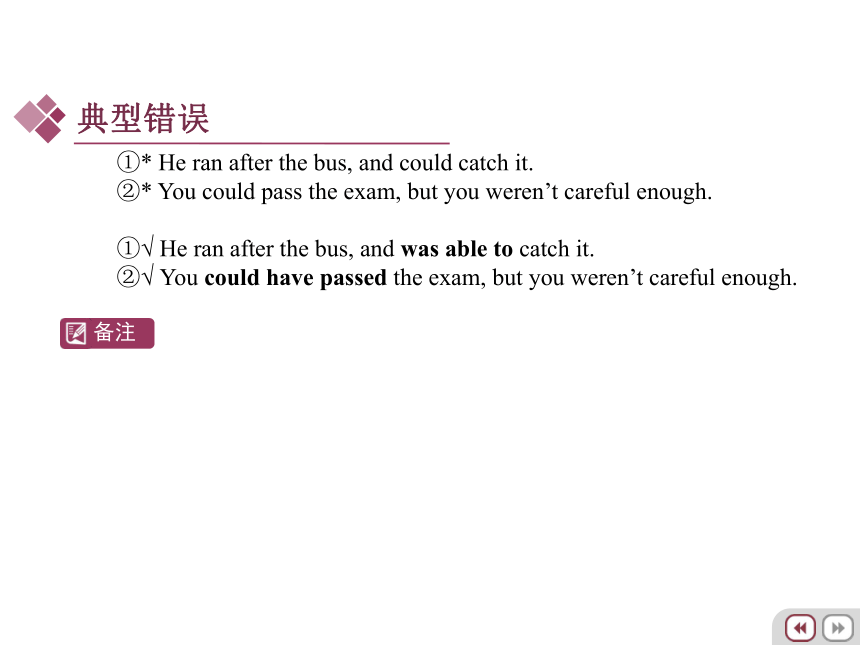

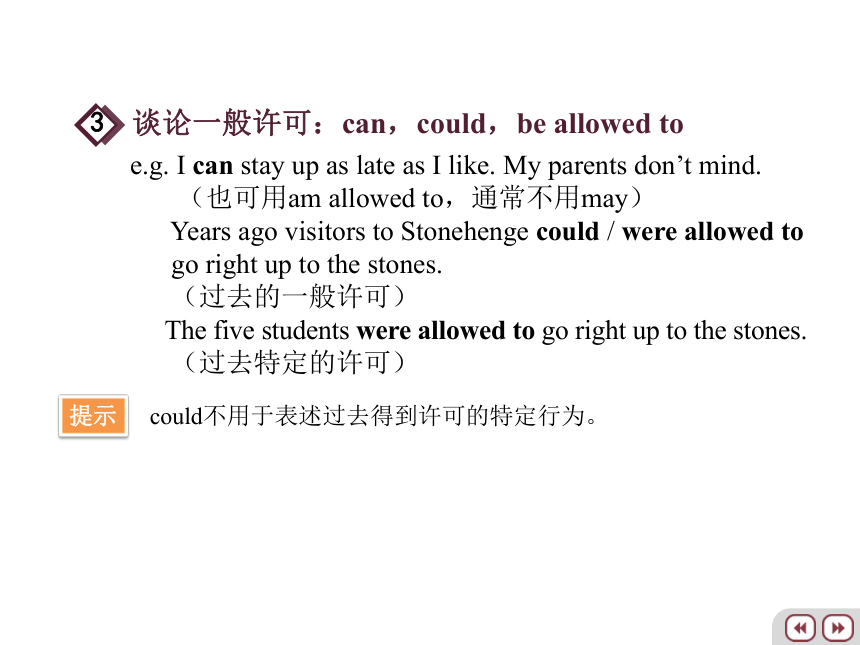
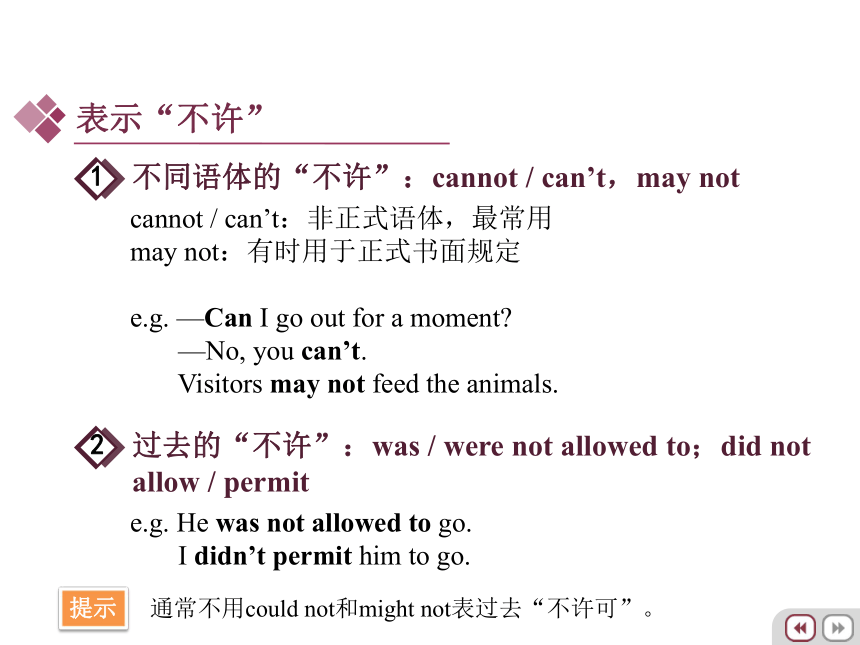
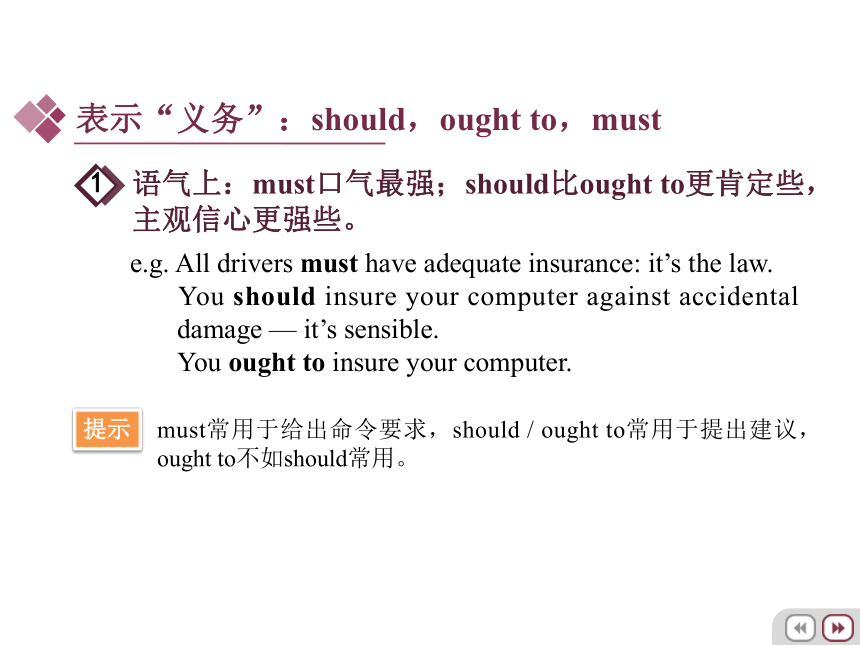
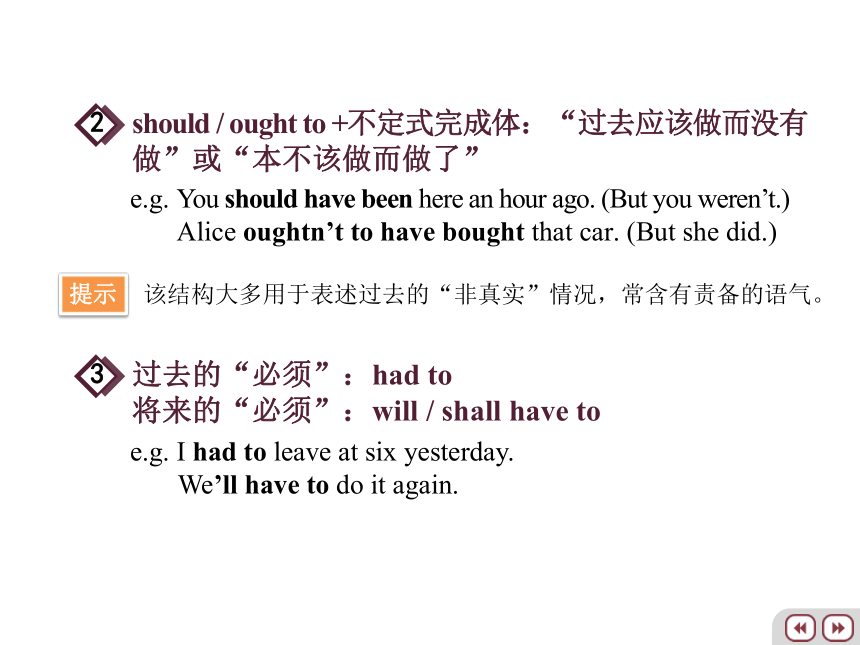
文档简介
(共41张PPT)
情态助动词值得注意的两个语法特征
e.g. Can I go now (现在的请求——直接)
Could I go now (现在的请求——更婉转,更礼貌)
情态助动词的过去式多半不表过去,大多用来表示委婉口气。
1
could,might,would,should通常不用作can,may,will,shall的过去式(但在间接引语中会有这种用法)。
提示
e.g. I can play the piano. (能力)
Can I ask a question (请求许可)
The story can’t be true. (不可能)
情态助动词大多一词多义。
2
两类情态意义
can / could / may / might:“可能”
will / would:“推测”
should / ought to / must:“必然”
表示“推测”、“可能”、“必然”等推测性意义
1
“可能”、“必然”和“预测”等推测性意义涉及人对于事情发生的可能性所作的主观判断。
提示
can / could:“能力”、“许可”
may / might:“许可”
will / would / shall:“意愿”、“意图”
should / ought to / must:“义务”
表示“能力”、“许可”、“意愿”、“意图”、“义务”等非推测性意义
2
“能力”、“意图”、“义务”等非推测性意义涉及人对事件的某种内在的控制。
提示
表示“能力”:can,could,be able to
肯定句:could(一般能力),was / were able to(“具体”能力)
e.g. She could play the piano when she was only six.
(“弹钢琴”是过去的一般能力)
He was able to translate the article without a dictionary.
(“翻译那篇文章”是过去具体做一桩事的能力)
过去的能力:could,was / were able to
1
succeeded in doing和managed to do与was / were able to do意义相同。
提示
e.g. I’ll be able to speak German in another two months.
If I can, I will do it.
将来的能力:will be able to(更典型),can
2
can表将来的能力,一般不与表将来的时间状语连用。
提示
表示“可能”:may,might,can,could
e.g. Who can that be at the door
Can it really be true
在疑问句中谈论可能性,通常用can,不用may。
1
e.g. The moon cannot always be at the full.
Smoking can damage your health. (理论上的可能性)
Lightning can be dangerous. (有时会发生的情况)
can表可能性时多用于疑问句、否定句,用于肯定句仅
指逻辑上或理论上的可能性。
2
e.g. I don’t know where the letter is. I may / might have thrown
it away.
The flight could have been delayed.
She can’t / could have missed the train.
过去的可能:may / might / could / can +不定式的完成体
3
might,could并非表过去,只是使语气更婉转,过去时间通过完成体形式体现。
“can +不定式的完成体”只能用于否定句和疑问句中。
提示1
提示2
e.g. You might have killed yourself. (不用may have killed)
I could have passed the examination, but I failed.
(不用can have passed)
“本可能发生但没有发生”:could / might have done
4
该句型表示与过去事实相反的假设,所以要用could,might等过去式的形式。
提示
典型错误
①* He ran after the bus, and could catch it.
②* You could pass the exam, but you weren’t careful enough.
①√ He ran after the bus, and was able to catch it.
②√ You could have passed the exam, but you weren’t careful enough.
备注
表示“许可”:can,could,may,might
can / could更常用;may / might更正式;
could更婉转,更礼貌,might极为客气,很少用。
e.g. Can / Could / May / Might I smoke in here
请求“许可”、“允诺”、“答应”:can,could,may,might
1
在表示“请求许可”等意义时,could,might都不是过去时态,can,could,may,might不存在时间的差异,这里都指将来。
提示
— Could I use your phone —Yes, of course you can.
— Might I trouble you for a light —You may indeed.
给予“许可”:can,may(较正式)
2
答句中不用could,might,给予“许可”不需要迟疑。
提示
e.g. I can stay up as late as I like. My parents don’t mind.
(也可用am allowed to,通常不用may)
Years ago visitors to Stonehenge could / were allowed to
go right up to the stones.
(过去的一般许可)
The five students were allowed to go right up to the stones.
(过去特定的许可)
谈论一般许可:can,could,be allowed to
3
could不用于表述过去得到许可的特定行为。
提示
表示“不许”
cannot / can’t:非正式语体,最常用
may not:有时用于正式书面规定
e.g. —Can I go out for a moment
—No, you can’t.
Visitors may not feed the animals.
不同语体的“不许”:cannot / can’t,may not
1
通常不用could not和might not表过去“不许可”。
提示
e.g. He was not allowed to go.
I didn’t permit him to go.
过去的“不许”:was / were not allowed to;did not
allow / permit
2
表示“义务”:should,ought to,must
e.g. All drivers must have adequate insurance: it’s the law.
You should insure your computer against accidental
damage — it’s sensible.
You ought to insure your computer.
语气上:must口气最强;should比ought to更肯定些,
主观信心更强些。
1
must常用于给出命令要求,should / ought to常用于提出建议,ought to不如should常用。
提示
该结构大多用于表述过去的“非真实”情况,常含有责备的语气。
提示
e.g. You should have been here an hour ago. (But you weren’t.)
Alice oughtn’t to have bought that car. (But she did.)
should / ought to +不定式完成体:“过去应该做而没有
做”或“本不该做而做了”
2
e.g. I had to leave at six yesterday.
We’ll have to do it again.
过去的“必须”:had to
将来的“必须”:will / shall have to
3
must not / mustn’t:“不许”、“禁止”,比can’t语气更强,相当于be not to。
need not / needn’t:“不必”,相当于don’t have to,don’t need to,haven’t got to。
e.g. You mustn’t tell Margaret — I don’t want her to know.
You needn’t tell Jennifer — she already knows.
must的两个否定式:must not / mustn’t
和 need not / needn’t
4
表示“必然”:should,ought to,must
e.g. Mary Blake must be home by now.
Mary Blake ought to be home by now.
Mary Blake should be home by now.
口气肯定程度:must > ought to > should
1
e.g. She can’t be at home: her car’s gone and there are no
lights on.
must表推测的否定式:cannot / can’t,不是mustn’t
2
mustn’t表示“不许”、“禁止”,属于非推测性意义。
提示
e.g. Her eyes are red. She must have been crying.
She reasoned that she must have left her bag on the train.
He can’t have been to your home. He doesn’t know your
address.
对过去事态的肯定性推测:must +不定式的完成体
其否定式:can’t +不定式的完成体
3
must have done的否定式不是mustn’t have done,而是can’t have done。
提示
典型错误
* That mustn’t be Mary — she’s in New York.
√ That can’t be Mary — she’s in New York.
备注
表示“推测”:(should,ought to,must)will,would
e.g. They must be home by now. (一定)
They will be home by now. (想必一定)
They would be home by now. (大概)
They should / ought to be home by now. (应该)
口气肯定程度梯度:must > will > would > ought to > should
1
(1)对特定事态的推测:will,would
e.g. A: Who’s that man over there
B: That will be George, no doubt. (一定)
B: That would be George, I expect. (大概)
will / would表“推测”的三种情况
2
would仍指现在时间,只是口气不够肯定。
提示
(2)对某些习惯性事态的推测:will(现在习惯),would(过去习惯)
e.g. She will listen to records, alone in her room, for hours.
She would spend hours in the bathroom or on the telephone.
(3)对某些不受时限的客观过程的推测:will(相当于一般现在时)
e.g. Oil will float on water. = Oil floats on water.
表示“意愿”:will,would,shall
e.g. I will / I’ll lend you the money if you need it.
Will Alice accept the invitation
will:用于一切人称,相当于be willing to
1
e.g. Will you kindly help me with the luggage
Would you be good enough to send me some books
客气的请求:Will you please / kindly… / Would you…
2
接受请求时,要用will,不用would。
提示
e.g. I asked him if he would help me with my writing.
(间接引语中)
When I was at college, I wouldn’t read any books solely
for pleasure.
(过去时间语境中)
过去的“意愿”:would
3
e.g. You shall stay with us as long as you like.
= I’m willing to let you stay with us as long as you like.
Shall my daughter do the shopping for you
= Are you willing to let my daughter do the shopping for you
shall表“意愿”:用于第二、三人称
肯定句:说话人的“意愿”
疑问句:征询听话人的“意愿”
4
表示“意图”:will,would,shall
e.g. I’ll get some drinks. What’ll you have
will:用于一切人称,相当于be going to
1
e.g. He would see her the next day, so he didn’t write to her.
过去的“意图”:would
2
e.g You shall get a promotion. = I’ll give you a promotion.
He shan’t come here. = I won’t let him come here.
shall表“意图”:用于第二、三人称陈述句,表示
说话人的“意图”
3
e.g. Shall I carry the suitcase for you = Do you want me to
carry your suitcase
shall表“意图”:用于第一人称疑问句,征询听话人
的意见或意图
4
美式英语中常用should取代shall,如“Should I turn off the light ”。
提示
表示“决心”:will, would, shall(重读,不缩写)
e.g. I 'will take the job and no one is going to stop me.
If you 'will go, you may go at once.
will:用于一切人称
1
e.g. She 'would marry him in spite of my warning that it was
unwise.
表过去的“决心”:would
2
e.g. You 'shall obey my orders. = I insist that you obey my orders.
Foreign countries 'shall not interfere in our internal affairs.
= We are determined not to allow any foreign country to
interfere in our internal affairs.
shall表“决心”:用于第二、三人称,表示说话人的“决心”
否定式shall not / shan’t:表示说话人“禁止”或“威胁”
3
Which of the following italicized words does NOT indicate willingness
A.
B.
C.
D.
What will you do when you graduate
They will be home by now.
Who will go with me
Why will you go there alone
该题考查情态助动词will的意义。A、C、D项will均表意愿,句意分别为“你毕业后愿意做什么工作?”、“谁愿意和我一起去?”、“为什么你要一个人去那里?”。B项中will不表意愿,而仅表示对现在情况的一种推测,意为“他们现在想必到家了”,因此,B为正确答案。
下面哪一句斜体部分的单词不表达意愿?
Which of the following sentences indicates POSSIBILITY
A.
B.
C.
D.
The moon cannot always be at the full.
You cannot smoke inside the building.
He cannot come today.
She cannot play the piano.
该题考查情态助动词can的意义。A句意为“月亮不可能总是圆的”,cannot表可能性,因此A为正确答案。B句意为“你不能在大楼内吸烟”,cannot表示禁止。C句意为“他今天不能来”,该句中的cannot既可能表能力,相当于will not be able to,也可能表禁止,即别人不允许他来,相当于be not allowed to。D句意为“她不会弹钢琴”,cannot表能力。
下列哪个句子表达可能性?
Which of the following sentences expresses a fact
A.
B.
C.
D.
Mary and her son must be home by now.
Careless reading must give poor results.
He must be working late at the office. It’s getting late, and I must leave now.
该题考查情态助动词must的意义。情态助动词must既可以表示义务,意为“必须”,也可以表示肯定的推测,意为“一定”。A句意为“玛丽和她儿子现在一定到家了”,B句意为“马马虎虎的阅读一定效果不好”,C句意为“他一定在办公室工作到很晚”,这三句中must都表肯定的推测。D句意为“天色不早了,现在我得走了”,句中must表义务,是对事实的一种陈述,因此D为正确答案。
下列哪句话表达一种事实?
Which of the following sentences expresses WILLINGNESS
A.
B.
C.
D.
By now she will be eating dinner.
I shall never do that again.
My brother will help you with the luggage.
You shall get a promotion.
该题考查情态助动词will和shall的意义和用法。A项意为“现在她应该在用餐了”,will表对现在情况的推测;B项意为“我再也不会那么做了”,shall表决心;C项意为“我哥哥会帮你拿行李的”,will表意愿,因此C为正确答案。D项意为“你应该升职了”,shall用于第二人称主语之后,表说话人的意图。
下列哪句话表达“意愿”?
Which of the following best explains the meaning of “Shall we buy the tickets first”
A.
B.
C.
D.
He said that we were going to buy the tickets first.
He requested that we buy the tickets first.
He suggested that we buy the tickets first.
He advised us to buy the tickets first.
该题考查情态助动词shall在疑问句中的交际功能。题干句型为“Shall I / we… ”疑问句,shall用于第一人称疑问句时,是在征询听话人的意见或意图,“Shall I / we… ”意为“要不要我/我们…?;我/我们…好不好?”,题干意为“我们要不要先买票?”。C项意为“他提议我们应该先买票”,suggest含有“提出意见供参考”的意思,与原句交际功能相同,因此C为正确答案。A项意为“他对我们说要先买票”,B项意为“他要求我们先买票”,D项意为“他让我们先买票”,request(要求;请求)和advise(劝告;忠告;建议)语气较强,均没有征求意见的意思。
下列哪句话能最好地解释“Shall we buy the tickets first”的意思?
The sentence that expresses OFFER is _____.
A.
B.
C.
D.
I’ll get some drinks. What’ll you have
Does she need to book a ticket now
May I know your name
Can you return the book next week
该题考查情态助动词will在疑问句中的交际功能。A项用于第二人称特殊疑问句中的will表提议,该句意为“我要去买些饮料,你想喝什么?”,因此A为正确答案。B项为一般疑问句,询问是否“需要”做某事;C项和D项是may和can引导的疑问句,为请求对方“许可”。
下面哪个句子表达“提议”? ____
Nancy’s gone to work but her car’s still there. She _______ by bus.
A.
B.
C.
D.
must have gone
should have gone
ought to have gone
could have gone
该题考查情态助动词“must + 不定式完成体”的用法。情态助动词“must + 不定式完成体”表对过去事态的推测,口气最为肯定。由has gone可知,“南希上班”发生在过去,是对过去事态最为肯定的推测,应该用must have done的形式,因此A为正确答案。B、C项意为“本该去但没有去”,D项意为“本可以去而没有去”,均与句意不符。
南希上班去了,但她的汽车还在那儿。她一定是坐公共汽车去的。
Which of the following sentences expresses “probability”
A.
B.
C.
D.
You must leave immediately.
You must be feeling rather tired.
You must be here by eight o’clock.
You must complete the reading assignment on time.
该题考查情态助动词must作推测性用法。must既可作非推测性用法表“义务”,也作推测性用法表“必然”。B项意为“你一定觉得很累了”,must作推测性用法,意为“一定”,是一种最为肯定的“可能”,因此B为正确答案。其他三项均为非推测性用法,表示“义务”,意为“必须”。
下面哪一句表示“可能”?
I went there in 1984, and that was the only occasion when I ________ the journey in exactly two days.
A.
B.
C.
D.
must make
must have made
was able to make
could make
该题考查半助动词was / were able to表过去的“能力”的用法。could和was / were able to都可以表示“过去的能力”,但在肯定句中,could所表示的“能力”仅是泛指过去的一般能力。如果要表示过去做某桩具体事情的“能力”,通常不用could,而用was / were able to。句中make the journey in exactly two days显然是过去(in 1984)做某桩具体事情的“能力”,因此C为正确答案。
我于1984年去过那里,而只有那一次我用了整整两天时间就完成了行程。
— “She must be in the dormitory now!”
— “No, she_______ be there. I saw her in the classroom a minute ago”.
A.
B.
C.
D.
mustn’t
can’t
couldn’t
wouldn’t
该题考查情态助动词can’t的推测性用法。must用于肯定句中时表推测,在否定句中表推测则要用can’t,意为“不可能”,不能用mustn’t。此题中前面一句表肯定,用must be,后面一句表否定,因此B为正确答案。
——“她现在一定在宿舍里。”
——“不,她不可能在那儿。刚才我还看到她在教室里。”
本讲从语义角度介绍了五组情态意义表示法,主要涉及情态助动词的意义和用法。由于情态助动词多半一词多义,在肯定句、疑问句或否定句中意义往往不尽相同,其“时”的特征并不是时间区别的主要标志,因此情态助动词是较难掌握的语法项目。学习中可首先总体了解情态助动词的重要语法特征,重点掌握情态助动词的意义和用法。“可能”、“必然”、“推测”等属推测性意义,can表“可能性”多用于疑问句、否定句中,用于肯定句仅指逻辑上的可能性;must表“必然”的否定式是can’t,不是mustn’t;will / would表“推测”有三种情况。要熟悉表达“能力”、“许可”、“义务”、“意图”等非推测的情态助动词及其他表达方式,如could在肯定句中表过去的“一般能力”,表过去的“具体”
能力要用was / were able to,表将来的能力通常用will / shall be able to。“情态助动词 + 不定式完成体”是“情态意义”和“过去时间”的结合,所以通常表示对过去事态的推测、过去的义务等意义。情态助动词的多义性是一个主要学习难点,可利用比较的方法区分同一情态助动词在具体语境中的不同意义及用法,如You must be careful.与You must be tired.,前者must表“义务”(必须),后者表“必然”(一定),前者的否定式是needn’t,后者的否定式是can’t。shall表“意愿”、“意图”用于第二、三人称的特殊用法可与用于第一人称的常见用法作比较。
1.0
2.
0
3.0
4.
I must get there before eight.
You will have to come again.
You must answer at once.
We had to begin very early.
I needn’t get there before eight.
You won’t have to come again.
You needn’t answer at once.
We didn’t have to begin very early.
a) Write each sentence in the negative (ie remove the idea of compulsion).
5.0
6.
0
7.0
8.
You must do it at once.
He mustn’t tell me.
You’ll have to read it again.
He says you are not to listen to them.
You had to do it at once.
He was not to tell me.
You had to read it again.
He said you weren’t to listen to them.
b) Write each sentence in the past tense.
1.0
2.0
3.
0
4.0
5.
他也许在做家庭作业。(may)
她可能忘了给我回电。(may)
我不知道现在是否可以离开。(could)
老汤姆也许已经离开圣迭戈(San Diego)。(might)
假如明天下雨,足球赛将延期举行。(should)
He may be doing his homework.
She may have forgotten to call me back.
I wonder if I could leave now.
Old Tom might have left San Diego.
If it should rain tomorrow, the football match would be put off.
6.0
7.0
8.
0
9.0
10.
你如果改变主意,请告诉我。(should)
他竟出了事故,真使我吃惊。(should)
你不可以再跟她顶嘴。(shall)
他一定已在山里迷路了。(must)
你本来不必给她写信。(need)
If you should change your mind, please let me know.
I’m surprised that he should have an accident.
You shan’t answer her back again.
He must have got lost in the mountains.
You needn’t have written to her.
11.
12.
13.
0
14.
15.
她本不应该买下那幢房子。(should)
别打搅他,我估计他一定已经听到这消息了。(will)
狮子只有饿了才会攻击人。(will)
玛丽现在该到家了。(ought to)
他曾在上海工作,可现在不知去向。(used to)
She shouldn’t have bought that house.
Don’t bother him. He will have heard the news.
A lion will attack people only when hungry.
Mary ought to be home by now.
He used to work in Shanghai, but now he is nowhere to be found.
情态助动词值得注意的两个语法特征
e.g. Can I go now (现在的请求——直接)
Could I go now (现在的请求——更婉转,更礼貌)
情态助动词的过去式多半不表过去,大多用来表示委婉口气。
1
could,might,would,should通常不用作can,may,will,shall的过去式(但在间接引语中会有这种用法)。
提示
e.g. I can play the piano. (能力)
Can I ask a question (请求许可)
The story can’t be true. (不可能)
情态助动词大多一词多义。
2
两类情态意义
can / could / may / might:“可能”
will / would:“推测”
should / ought to / must:“必然”
表示“推测”、“可能”、“必然”等推测性意义
1
“可能”、“必然”和“预测”等推测性意义涉及人对于事情发生的可能性所作的主观判断。
提示
can / could:“能力”、“许可”
may / might:“许可”
will / would / shall:“意愿”、“意图”
should / ought to / must:“义务”
表示“能力”、“许可”、“意愿”、“意图”、“义务”等非推测性意义
2
“能力”、“意图”、“义务”等非推测性意义涉及人对事件的某种内在的控制。
提示
表示“能力”:can,could,be able to
肯定句:could(一般能力),was / were able to(“具体”能力)
e.g. She could play the piano when she was only six.
(“弹钢琴”是过去的一般能力)
He was able to translate the article without a dictionary.
(“翻译那篇文章”是过去具体做一桩事的能力)
过去的能力:could,was / were able to
1
succeeded in doing和managed to do与was / were able to do意义相同。
提示
e.g. I’ll be able to speak German in another two months.
If I can, I will do it.
将来的能力:will be able to(更典型),can
2
can表将来的能力,一般不与表将来的时间状语连用。
提示
表示“可能”:may,might,can,could
e.g. Who can that be at the door
Can it really be true
在疑问句中谈论可能性,通常用can,不用may。
1
e.g. The moon cannot always be at the full.
Smoking can damage your health. (理论上的可能性)
Lightning can be dangerous. (有时会发生的情况)
can表可能性时多用于疑问句、否定句,用于肯定句仅
指逻辑上或理论上的可能性。
2
e.g. I don’t know where the letter is. I may / might have thrown
it away.
The flight could have been delayed.
She can’t / could have missed the train.
过去的可能:may / might / could / can +不定式的完成体
3
might,could并非表过去,只是使语气更婉转,过去时间通过完成体形式体现。
“can +不定式的完成体”只能用于否定句和疑问句中。
提示1
提示2
e.g. You might have killed yourself. (不用may have killed)
I could have passed the examination, but I failed.
(不用can have passed)
“本可能发生但没有发生”:could / might have done
4
该句型表示与过去事实相反的假设,所以要用could,might等过去式的形式。
提示
典型错误
①* He ran after the bus, and could catch it.
②* You could pass the exam, but you weren’t careful enough.
①√ He ran after the bus, and was able to catch it.
②√ You could have passed the exam, but you weren’t careful enough.
备注
表示“许可”:can,could,may,might
can / could更常用;may / might更正式;
could更婉转,更礼貌,might极为客气,很少用。
e.g. Can / Could / May / Might I smoke in here
请求“许可”、“允诺”、“答应”:can,could,may,might
1
在表示“请求许可”等意义时,could,might都不是过去时态,can,could,may,might不存在时间的差异,这里都指将来。
提示
— Could I use your phone —Yes, of course you can.
— Might I trouble you for a light —You may indeed.
给予“许可”:can,may(较正式)
2
答句中不用could,might,给予“许可”不需要迟疑。
提示
e.g. I can stay up as late as I like. My parents don’t mind.
(也可用am allowed to,通常不用may)
Years ago visitors to Stonehenge could / were allowed to
go right up to the stones.
(过去的一般许可)
The five students were allowed to go right up to the stones.
(过去特定的许可)
谈论一般许可:can,could,be allowed to
3
could不用于表述过去得到许可的特定行为。
提示
表示“不许”
cannot / can’t:非正式语体,最常用
may not:有时用于正式书面规定
e.g. —Can I go out for a moment
—No, you can’t.
Visitors may not feed the animals.
不同语体的“不许”:cannot / can’t,may not
1
通常不用could not和might not表过去“不许可”。
提示
e.g. He was not allowed to go.
I didn’t permit him to go.
过去的“不许”:was / were not allowed to;did not
allow / permit
2
表示“义务”:should,ought to,must
e.g. All drivers must have adequate insurance: it’s the law.
You should insure your computer against accidental
damage — it’s sensible.
You ought to insure your computer.
语气上:must口气最强;should比ought to更肯定些,
主观信心更强些。
1
must常用于给出命令要求,should / ought to常用于提出建议,ought to不如should常用。
提示
该结构大多用于表述过去的“非真实”情况,常含有责备的语气。
提示
e.g. You should have been here an hour ago. (But you weren’t.)
Alice oughtn’t to have bought that car. (But she did.)
should / ought to +不定式完成体:“过去应该做而没有
做”或“本不该做而做了”
2
e.g. I had to leave at six yesterday.
We’ll have to do it again.
过去的“必须”:had to
将来的“必须”:will / shall have to
3
must not / mustn’t:“不许”、“禁止”,比can’t语气更强,相当于be not to。
need not / needn’t:“不必”,相当于don’t have to,don’t need to,haven’t got to。
e.g. You mustn’t tell Margaret — I don’t want her to know.
You needn’t tell Jennifer — she already knows.
must的两个否定式:must not / mustn’t
和 need not / needn’t
4
表示“必然”:should,ought to,must
e.g. Mary Blake must be home by now.
Mary Blake ought to be home by now.
Mary Blake should be home by now.
口气肯定程度:must > ought to > should
1
e.g. She can’t be at home: her car’s gone and there are no
lights on.
must表推测的否定式:cannot / can’t,不是mustn’t
2
mustn’t表示“不许”、“禁止”,属于非推测性意义。
提示
e.g. Her eyes are red. She must have been crying.
She reasoned that she must have left her bag on the train.
He can’t have been to your home. He doesn’t know your
address.
对过去事态的肯定性推测:must +不定式的完成体
其否定式:can’t +不定式的完成体
3
must have done的否定式不是mustn’t have done,而是can’t have done。
提示
典型错误
* That mustn’t be Mary — she’s in New York.
√ That can’t be Mary — she’s in New York.
备注
表示“推测”:(should,ought to,must)will,would
e.g. They must be home by now. (一定)
They will be home by now. (想必一定)
They would be home by now. (大概)
They should / ought to be home by now. (应该)
口气肯定程度梯度:must > will > would > ought to > should
1
(1)对特定事态的推测:will,would
e.g. A: Who’s that man over there
B: That will be George, no doubt. (一定)
B: That would be George, I expect. (大概)
will / would表“推测”的三种情况
2
would仍指现在时间,只是口气不够肯定。
提示
(2)对某些习惯性事态的推测:will(现在习惯),would(过去习惯)
e.g. She will listen to records, alone in her room, for hours.
She would spend hours in the bathroom or on the telephone.
(3)对某些不受时限的客观过程的推测:will(相当于一般现在时)
e.g. Oil will float on water. = Oil floats on water.
表示“意愿”:will,would,shall
e.g. I will / I’ll lend you the money if you need it.
Will Alice accept the invitation
will:用于一切人称,相当于be willing to
1
e.g. Will you kindly help me with the luggage
Would you be good enough to send me some books
客气的请求:Will you please / kindly… / Would you…
2
接受请求时,要用will,不用would。
提示
e.g. I asked him if he would help me with my writing.
(间接引语中)
When I was at college, I wouldn’t read any books solely
for pleasure.
(过去时间语境中)
过去的“意愿”:would
3
e.g. You shall stay with us as long as you like.
= I’m willing to let you stay with us as long as you like.
Shall my daughter do the shopping for you
= Are you willing to let my daughter do the shopping for you
shall表“意愿”:用于第二、三人称
肯定句:说话人的“意愿”
疑问句:征询听话人的“意愿”
4
表示“意图”:will,would,shall
e.g. I’ll get some drinks. What’ll you have
will:用于一切人称,相当于be going to
1
e.g. He would see her the next day, so he didn’t write to her.
过去的“意图”:would
2
e.g You shall get a promotion. = I’ll give you a promotion.
He shan’t come here. = I won’t let him come here.
shall表“意图”:用于第二、三人称陈述句,表示
说话人的“意图”
3
e.g. Shall I carry the suitcase for you = Do you want me to
carry your suitcase
shall表“意图”:用于第一人称疑问句,征询听话人
的意见或意图
4
美式英语中常用should取代shall,如“Should I turn off the light ”。
提示
表示“决心”:will, would, shall(重读,不缩写)
e.g. I 'will take the job and no one is going to stop me.
If you 'will go, you may go at once.
will:用于一切人称
1
e.g. She 'would marry him in spite of my warning that it was
unwise.
表过去的“决心”:would
2
e.g. You 'shall obey my orders. = I insist that you obey my orders.
Foreign countries 'shall not interfere in our internal affairs.
= We are determined not to allow any foreign country to
interfere in our internal affairs.
shall表“决心”:用于第二、三人称,表示说话人的“决心”
否定式shall not / shan’t:表示说话人“禁止”或“威胁”
3
Which of the following italicized words does NOT indicate willingness
A.
B.
C.
D.
What will you do when you graduate
They will be home by now.
Who will go with me
Why will you go there alone
该题考查情态助动词will的意义。A、C、D项will均表意愿,句意分别为“你毕业后愿意做什么工作?”、“谁愿意和我一起去?”、“为什么你要一个人去那里?”。B项中will不表意愿,而仅表示对现在情况的一种推测,意为“他们现在想必到家了”,因此,B为正确答案。
下面哪一句斜体部分的单词不表达意愿?
Which of the following sentences indicates POSSIBILITY
A.
B.
C.
D.
The moon cannot always be at the full.
You cannot smoke inside the building.
He cannot come today.
She cannot play the piano.
该题考查情态助动词can的意义。A句意为“月亮不可能总是圆的”,cannot表可能性,因此A为正确答案。B句意为“你不能在大楼内吸烟”,cannot表示禁止。C句意为“他今天不能来”,该句中的cannot既可能表能力,相当于will not be able to,也可能表禁止,即别人不允许他来,相当于be not allowed to。D句意为“她不会弹钢琴”,cannot表能力。
下列哪个句子表达可能性?
Which of the following sentences expresses a fact
A.
B.
C.
D.
Mary and her son must be home by now.
Careless reading must give poor results.
He must be working late at the office. It’s getting late, and I must leave now.
该题考查情态助动词must的意义。情态助动词must既可以表示义务,意为“必须”,也可以表示肯定的推测,意为“一定”。A句意为“玛丽和她儿子现在一定到家了”,B句意为“马马虎虎的阅读一定效果不好”,C句意为“他一定在办公室工作到很晚”,这三句中must都表肯定的推测。D句意为“天色不早了,现在我得走了”,句中must表义务,是对事实的一种陈述,因此D为正确答案。
下列哪句话表达一种事实?
Which of the following sentences expresses WILLINGNESS
A.
B.
C.
D.
By now she will be eating dinner.
I shall never do that again.
My brother will help you with the luggage.
You shall get a promotion.
该题考查情态助动词will和shall的意义和用法。A项意为“现在她应该在用餐了”,will表对现在情况的推测;B项意为“我再也不会那么做了”,shall表决心;C项意为“我哥哥会帮你拿行李的”,will表意愿,因此C为正确答案。D项意为“你应该升职了”,shall用于第二人称主语之后,表说话人的意图。
下列哪句话表达“意愿”?
Which of the following best explains the meaning of “Shall we buy the tickets first”
A.
B.
C.
D.
He said that we were going to buy the tickets first.
He requested that we buy the tickets first.
He suggested that we buy the tickets first.
He advised us to buy the tickets first.
该题考查情态助动词shall在疑问句中的交际功能。题干句型为“Shall I / we… ”疑问句,shall用于第一人称疑问句时,是在征询听话人的意见或意图,“Shall I / we… ”意为“要不要我/我们…?;我/我们…好不好?”,题干意为“我们要不要先买票?”。C项意为“他提议我们应该先买票”,suggest含有“提出意见供参考”的意思,与原句交际功能相同,因此C为正确答案。A项意为“他对我们说要先买票”,B项意为“他要求我们先买票”,D项意为“他让我们先买票”,request(要求;请求)和advise(劝告;忠告;建议)语气较强,均没有征求意见的意思。
下列哪句话能最好地解释“Shall we buy the tickets first”的意思?
The sentence that expresses OFFER is _____.
A.
B.
C.
D.
I’ll get some drinks. What’ll you have
Does she need to book a ticket now
May I know your name
Can you return the book next week
该题考查情态助动词will在疑问句中的交际功能。A项用于第二人称特殊疑问句中的will表提议,该句意为“我要去买些饮料,你想喝什么?”,因此A为正确答案。B项为一般疑问句,询问是否“需要”做某事;C项和D项是may和can引导的疑问句,为请求对方“许可”。
下面哪个句子表达“提议”? ____
Nancy’s gone to work but her car’s still there. She _______ by bus.
A.
B.
C.
D.
must have gone
should have gone
ought to have gone
could have gone
该题考查情态助动词“must + 不定式完成体”的用法。情态助动词“must + 不定式完成体”表对过去事态的推测,口气最为肯定。由has gone可知,“南希上班”发生在过去,是对过去事态最为肯定的推测,应该用must have done的形式,因此A为正确答案。B、C项意为“本该去但没有去”,D项意为“本可以去而没有去”,均与句意不符。
南希上班去了,但她的汽车还在那儿。她一定是坐公共汽车去的。
Which of the following sentences expresses “probability”
A.
B.
C.
D.
You must leave immediately.
You must be feeling rather tired.
You must be here by eight o’clock.
You must complete the reading assignment on time.
该题考查情态助动词must作推测性用法。must既可作非推测性用法表“义务”,也作推测性用法表“必然”。B项意为“你一定觉得很累了”,must作推测性用法,意为“一定”,是一种最为肯定的“可能”,因此B为正确答案。其他三项均为非推测性用法,表示“义务”,意为“必须”。
下面哪一句表示“可能”?
I went there in 1984, and that was the only occasion when I ________ the journey in exactly two days.
A.
B.
C.
D.
must make
must have made
was able to make
could make
该题考查半助动词was / were able to表过去的“能力”的用法。could和was / were able to都可以表示“过去的能力”,但在肯定句中,could所表示的“能力”仅是泛指过去的一般能力。如果要表示过去做某桩具体事情的“能力”,通常不用could,而用was / were able to。句中make the journey in exactly two days显然是过去(in 1984)做某桩具体事情的“能力”,因此C为正确答案。
我于1984年去过那里,而只有那一次我用了整整两天时间就完成了行程。
— “She must be in the dormitory now!”
— “No, she_______ be there. I saw her in the classroom a minute ago”.
A.
B.
C.
D.
mustn’t
can’t
couldn’t
wouldn’t
该题考查情态助动词can’t的推测性用法。must用于肯定句中时表推测,在否定句中表推测则要用can’t,意为“不可能”,不能用mustn’t。此题中前面一句表肯定,用must be,后面一句表否定,因此B为正确答案。
——“她现在一定在宿舍里。”
——“不,她不可能在那儿。刚才我还看到她在教室里。”
本讲从语义角度介绍了五组情态意义表示法,主要涉及情态助动词的意义和用法。由于情态助动词多半一词多义,在肯定句、疑问句或否定句中意义往往不尽相同,其“时”的特征并不是时间区别的主要标志,因此情态助动词是较难掌握的语法项目。学习中可首先总体了解情态助动词的重要语法特征,重点掌握情态助动词的意义和用法。“可能”、“必然”、“推测”等属推测性意义,can表“可能性”多用于疑问句、否定句中,用于肯定句仅指逻辑上的可能性;must表“必然”的否定式是can’t,不是mustn’t;will / would表“推测”有三种情况。要熟悉表达“能力”、“许可”、“义务”、“意图”等非推测的情态助动词及其他表达方式,如could在肯定句中表过去的“一般能力”,表过去的“具体”
能力要用was / were able to,表将来的能力通常用will / shall be able to。“情态助动词 + 不定式完成体”是“情态意义”和“过去时间”的结合,所以通常表示对过去事态的推测、过去的义务等意义。情态助动词的多义性是一个主要学习难点,可利用比较的方法区分同一情态助动词在具体语境中的不同意义及用法,如You must be careful.与You must be tired.,前者must表“义务”(必须),后者表“必然”(一定),前者的否定式是needn’t,后者的否定式是can’t。shall表“意愿”、“意图”用于第二、三人称的特殊用法可与用于第一人称的常见用法作比较。
1.0
2.
0
3.0
4.
I must get there before eight.
You will have to come again.
You must answer at once.
We had to begin very early.
I needn’t get there before eight.
You won’t have to come again.
You needn’t answer at once.
We didn’t have to begin very early.
a) Write each sentence in the negative (ie remove the idea of compulsion).
5.0
6.
0
7.0
8.
You must do it at once.
He mustn’t tell me.
You’ll have to read it again.
He says you are not to listen to them.
You had to do it at once.
He was not to tell me.
You had to read it again.
He said you weren’t to listen to them.
b) Write each sentence in the past tense.
1.0
2.0
3.
0
4.0
5.
他也许在做家庭作业。(may)
她可能忘了给我回电。(may)
我不知道现在是否可以离开。(could)
老汤姆也许已经离开圣迭戈(San Diego)。(might)
假如明天下雨,足球赛将延期举行。(should)
He may be doing his homework.
She may have forgotten to call me back.
I wonder if I could leave now.
Old Tom might have left San Diego.
If it should rain tomorrow, the football match would be put off.
6.0
7.0
8.
0
9.0
10.
你如果改变主意,请告诉我。(should)
他竟出了事故,真使我吃惊。(should)
你不可以再跟她顶嘴。(shall)
他一定已在山里迷路了。(must)
你本来不必给她写信。(need)
If you should change your mind, please let me know.
I’m surprised that he should have an accident.
You shan’t answer her back again.
He must have got lost in the mountains.
You needn’t have written to her.
11.
12.
13.
0
14.
15.
她本不应该买下那幢房子。(should)
别打搅他,我估计他一定已经听到这消息了。(will)
狮子只有饿了才会攻击人。(will)
玛丽现在该到家了。(ought to)
他曾在上海工作,可现在不知去向。(used to)
She shouldn’t have bought that house.
Don’t bother him. He will have heard the news.
A lion will attack people only when hungry.
Mary ought to be home by now.
He used to work in Shanghai, but now he is nowhere to be found.
同课章节目录
